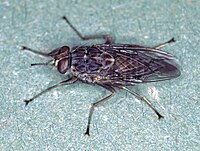
Photo from wikipedia
Human African trypanosomiasis (HAT) is a neglected tropical disease that has not received much attention in Zambia and most of the countries in which it occurs. In this study, we… Click to show full abstract
Human African trypanosomiasis (HAT) is a neglected tropical disease that has not received much attention in Zambia and most of the countries in which it occurs. In this study, we assessed the adequacy of the healthcare delivery system in diagnosis and management of rHAT cases, the environmental factors associated with transmission, the population at risk and the geographical location of rHAT cases. Structured questionnaires, focus group discussions and key informant interviews were conducted among the affected communities and health workers. The study identified 64 cases of rHAT, of which 26 were identified through active surveillance and 38 through passive surveillance. We identified a significant association between knowledge of the vector for rHAT and knowledge of rHAT transmission (p < 0.028). In all four districts, late or poor diagnosis occurred due to a lack of qualified laboratory technicians and diagnostic equipment. This study reveals that the current Zambian healthcare system is not able to adequately handle rHAT cases. Targeted policies to improve staff training in rHAT disease detection and management are needed to ensure that sustainable elimination of this public health problem is achieved in line with global targets.
Journal Title: Tropical Medicine and Infectious Disease
Year Published: 2022
Link to full text (if available)
Share on Social Media: Sign Up to like & get
recommendations!